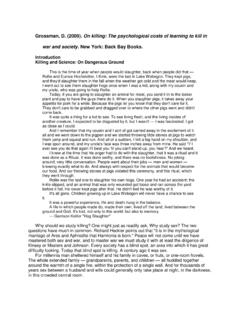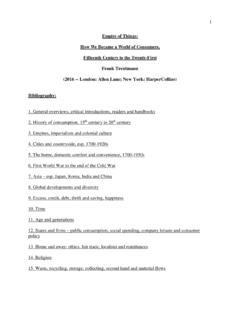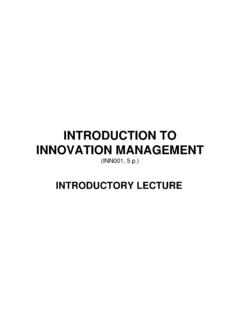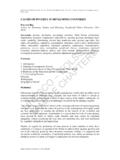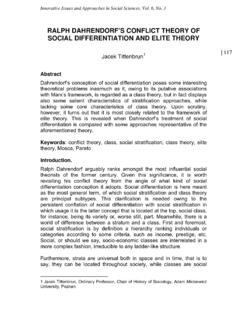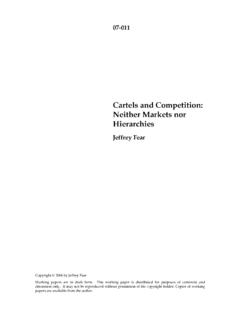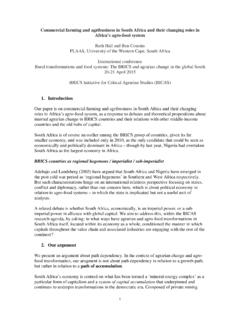Transcription of Cohen, J. & Rogers, J. (1986). Rules of the game: American ...
1 Cohen, J. & Rogers, J. (1986). Rules of the game: American politics and the Central America movement. Boston: South End Press, pp. 4 16. American Exceptionalism and the Politics of Fragmentation The essence of politics is collective action different people acting together for the achieve-ment of common aims. There are many conditions for such action including common interests, an awareness of those interests, a willingness to cooperate with one another, and the ability to sustain the costs of that cooperation. On all these dimensions and others, the structure of the political system tends to constrain collective action by people of ordinary means.
2 Most importantly, American political conflict and bargaining is extremely fragmented. Instead of bringing people together, the basic structures of American politics tend to keep them separate and divided, while encouraging the pursuit of narrower interests. This division raises the costs of coordination. Its effects are most sharply pronounced among those who have few resources to begin with that is, among those whose "strength is in numbers," and not in their wallets. Reflecting these tendencies to fragmentation, ordinary people in the are among the most politically disorganized in the world. Most strikingly, perhaps, the is virtually unique among advanced industrial capitalist democracies in never having had a labor party or socialist movement of significant strength and duration.
3 To this day, conventional political debate here is not marked by the sort of class-based cleavages and terms ("workers" versus "capitalists") characteristic of the political systems of Italy, France, Germany, England, and indeed most of [the] advanced industrial world. This peculiar absence of class politics in the one instance of the general fragmentation of the political system is called " American exceptionalism." ..What generates these conditions in the first place? As might be expected, the answer is that over the course of history many factors have contributed, and that the importance of particular factors, and their interaction with others, has shifted over the course of history.
4 Such historical variation and political complexity pose severe problems in providing an adequate rendering of American exceptionalism problems which, we should emphasize, we do not pretend to solve here. These important complexities aside, however, there are six basic factors which can be identified as having contributed throughout all of history. Reinforcing one another, and given varied political expression, they have always been central to producing, and reproducing, the politics of fragmentation. Constitutional Design The basic founding document of the United States, the Constitution, mandates a fragmented government structure.
5 This has permitted, within a single nation, considerable political experi-mentation, particularly at the local level, and has helped ensure certain limits on the abuse of centralized powers. But the clear effect of constitutional fragmentation has also been to limit the potential for political cooperation among people of ordinary means, and this was something that the architects of the constitutional system, the "founding fathers," clearly recognized and desired. In The Federalist Papers, for example, James Madison explained that a fragmented system would help cure "the mischiefs of faction," whose most common source was the distribution of property ownership: Those who hold and those who are without property have ever formed distinct interests in society.
6 Those who are creditors, and those who are debtors, fall under a like The regulation of these various and interfering interests forms the principal task of modern legislation and involves the spirit of party and faction in the necessary and ordinary operations of government. Madison was particularly concerned that a "majority faction" composed of those owning little property might come together to challenge inequalities in wealth and income. He saw two ways to prevent its formation: Either the existence of the same passion or interest in a majority at the same time must be prevented, or the majority, having such coexistent passion or interest, must be rendered, by their number and local situation, unable to concert and carry into effect schemes of oppression.
7 In the constitutional scheme they eventually agreed upon, Madison and the other framers accordingly sought both to prevent majorities from forming common programs, and to impose barriers to the implementation of those programs, should they be formed. The most straightforward way this was done was by weakening and dividing the American state. The Constitution, for example, mandates a separation of powers at the national level. The legislative, executive, and judicial functions 'are each assigned to distinct branches of government, and each branch is given powers to block the activities of the other two.
8 While the power of the judiciary to curtail Congressional or Presidential action is great, probably the most important separation and source of blockage is that between executive and legislative authority. In contrast to parliamentary systems of representation, where the leader of the dominant party (or coalition of parties) in the legislature is also the chief executive of government, the Constitution mandates separate elections for Congress and the Presidency. This has commonly meant, as is currently the case, that the President comes from a party that does not command a majority within the legislature.
9 Such differences between the executive and the legislature typically generate barriers to concerted national policy except of course in those cases (foreign affairs being the source of most examples) where "bipartisan consensus" obtains between the major parties. Additionally limiting the effectiveness of the national government, and limiting the potential for the emergence of majoritarian factions, is the principle of federalism. This means that public power is shared between the national government and the states. By contrast with "unified" governments, where subnational units are extensions of a central authority, the United States is a "divided" government, in which the states enjoy powers independent of the Federal government.
10 Competing with the Federal government and one another, the 50 states produce wide variations in policy on basic issues, and reinforce political diversity and Even within national government, moreover, federalism shapes the perspective and interests of Congress. Candidates for Congress are not selected by national parties, but by state and local organizations. Members are then elected by local constituencies, and to stay in Congress they must satisfy the interests of those constituencies. Local interests are thus represented both in state governments and the national legislature. In fact, aside from the Presidency (and even there the case is ambiguous), there is no Federal office or body whose members are selected by exclusively national criteria.

